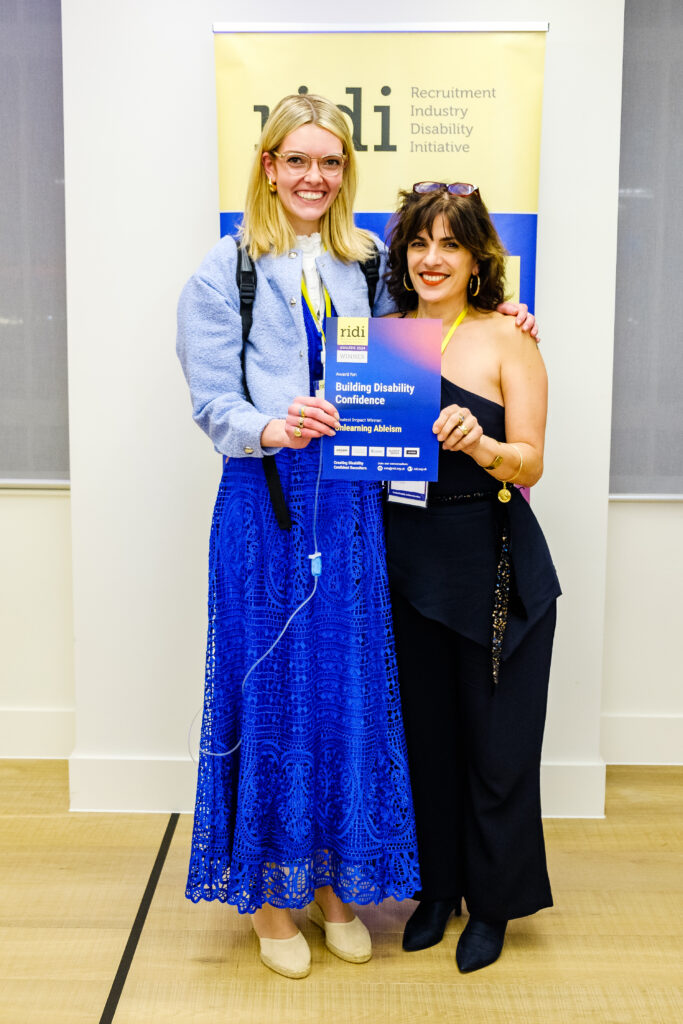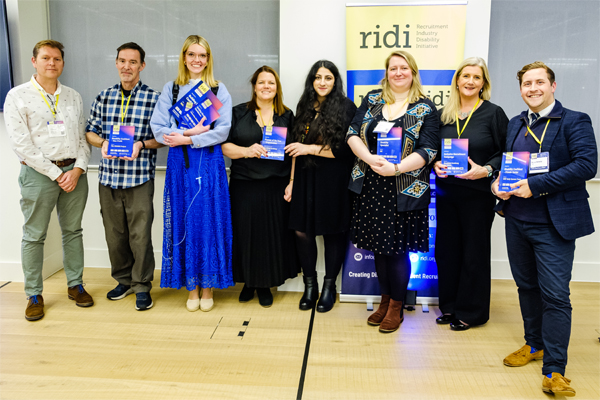Maria Grazia Zedda, RIDI’s new Chair of Judges and Head of Equality, Diversity, Inclusion and Wellbeing at Marie Curie, shares her insights from this year’s RIDI Awards winners and why disability inclusion isn’t just a tickbox exercise.
Disability inclusion in the workplace is not just a moral imperative – it’s a strategic advantage. This year’s Recruitment Industry Disability Initiative (RIDI) Awards highlighted organisations and individuals that are leading the way in fostering inclusive workplaces. From transforming recruitment practices to developing innovative training tools, these trailblazers demonstrate how businesses can embrace disability confidence to unlock untapped talent and drive meaningful change.
WHY DISABILITY CONFIDENCE MATTERS
Despite 17% of the world’s population identifying as disabled, systemic barriers continue to exclude disabled individuals from full participation in society. Building disability confidence requires addressing these barriers across recruitment, workplace culture, and policies.
The RIDI Awards winners show how this can be achieved with intentionality, innovation, and collaboration.
ABOUT THE WINNERS
This year’s winners represent diverse sectors, from private firms like Irwin Mitchell to public initiatives like the CRUMBS Project. Each winner has made tangible progress toward disability inclusion, whether by improving recruitment practices, developing accessible technologies, or providing tailored support for employees. Their stories reveal the practical steps organisations can take to ensure disabled individuals thrive in the workplace.

INCLUSIVE HIRING PRACTICES
Irwin Mitchell revamped its recruitment process to attract and support disabled candidates, collaborating with platforms like Evenbreak to reach more diverse talent pools. Their efforts led to a 62% rise in applications from disabled candidates, showcasing how proactive adjustments can widen access to opportunity.
Similarly, DWF’s Early Careers Team focused on removing barriers for disadvantaged applicants. Through contextual recruitment, adjustments during assessments, and dedicated support, they saw a 39.6% increase in disability representation among trainees and apprentices – a testament to the power of tailored strategies.
INNOVATIONS IN RECRUITMENT TECHNOLOGY
The Stepstone Group introduced its Accessibility Lab, a hands-on training tool that helps employees understand the barriers faced by disabled individuals. By embedding accessibility into its recruitment technologies, the Stepstone Group is aligning with its mission of equitable job access.
For employers looking to enhance their recruitment practices, the key takeaway is clear: accessibility must be a foundational consideration, not an afterthought.
CHAMPIONING DISABILITY CONFIDENCE
Creating an inclusive culture starts with leadership and advocacy. The CRUMBS Project exemplifies this with its tailored training programs and partnerships that empower disabled employees. Over 50% of their staff identify as disabled, reflecting their commitment to walking the talk.
Meanwhile, SIC’s Reverse Jobs Fair Programme pairs jobseekers with mentors, ensuring that disabled candidates receive the support they need to thrive. By fostering collaboration between candidates and employers, they’re closing the disability employment gap in innovative ways.
EMBEDDING ACCESSIBILITY IN COMPANY VALUES
At The Stepstone Group, Mimouna Mahdaoui’s leadership in digital accessibility demonstrates the transformative impact of internal champions. Her initiatives, such as founding the Champions of Accessibility Network (CAN), ensure that accessibility is woven into the fabric of the organisation’s culture and operations.
These examples show that creating an inclusive workplace requires both systemic changes and a commitment to continuous learning.
CROSS-SECTOR COLLABORATION
Partnerships are a cornerstone of disability inclusion. Fair Shot Café’s collaboration with Great Western Railway (GWR) illustrates how tailored support, like job carving and coaching, can create successful outcomes for disabled employees and their employers.
By working with over 30 charities, Randstad Academy for Talent expands access to underrepresented talent pools, filling over 60 roles for neurodiverse and disabled candidates. Their example demonstrates that partnerships can amplify impact and ensure that no one is left behind.
SUPPORTING COMMUNITIES BEYOND THE WORKPLACE
Unlearning Ableism tackles ableism at its roots by raising awareness and dismantling ingrained biases. Through podcasts, live events, and policy advocacy, they’re creating a ripple effect of inclusion across industries.
For organisations, engaging with external experts and communities can enhance their disability confidence and create a more equitable society.
DRIVING CHANGE: THE PATH AHEAD
The RIDI Awards winners have set a high standard for disability inclusion, but their success stories also serve as roadmaps for other organisations. Whether you’re a small business or a multinational corporation, here are some actionable steps:
- Review recruitment processes for accessibility, from job postings to onboarding.
- Invest in training and education to build awareness and empathy among employees.
- Collaborate with disability-focused organisations to expand your reach and expertise.
- Embed accessibility into your operations, from technology to workplace policies.
- Celebrate and learn from success stories, both internally and externally.
Disability inclusion isn’t just a box to tick – it’s a continuous journey that benefits everyone. By embracing disability confidence, organisations can create workplaces where talent thrives and diversity is celebrated. Let’s learn from these trailblazers and work toward a future where everyone has the opportunity to succeed. Click here to check out this year’s RIDI Award winners, highly commended and finalists.







































